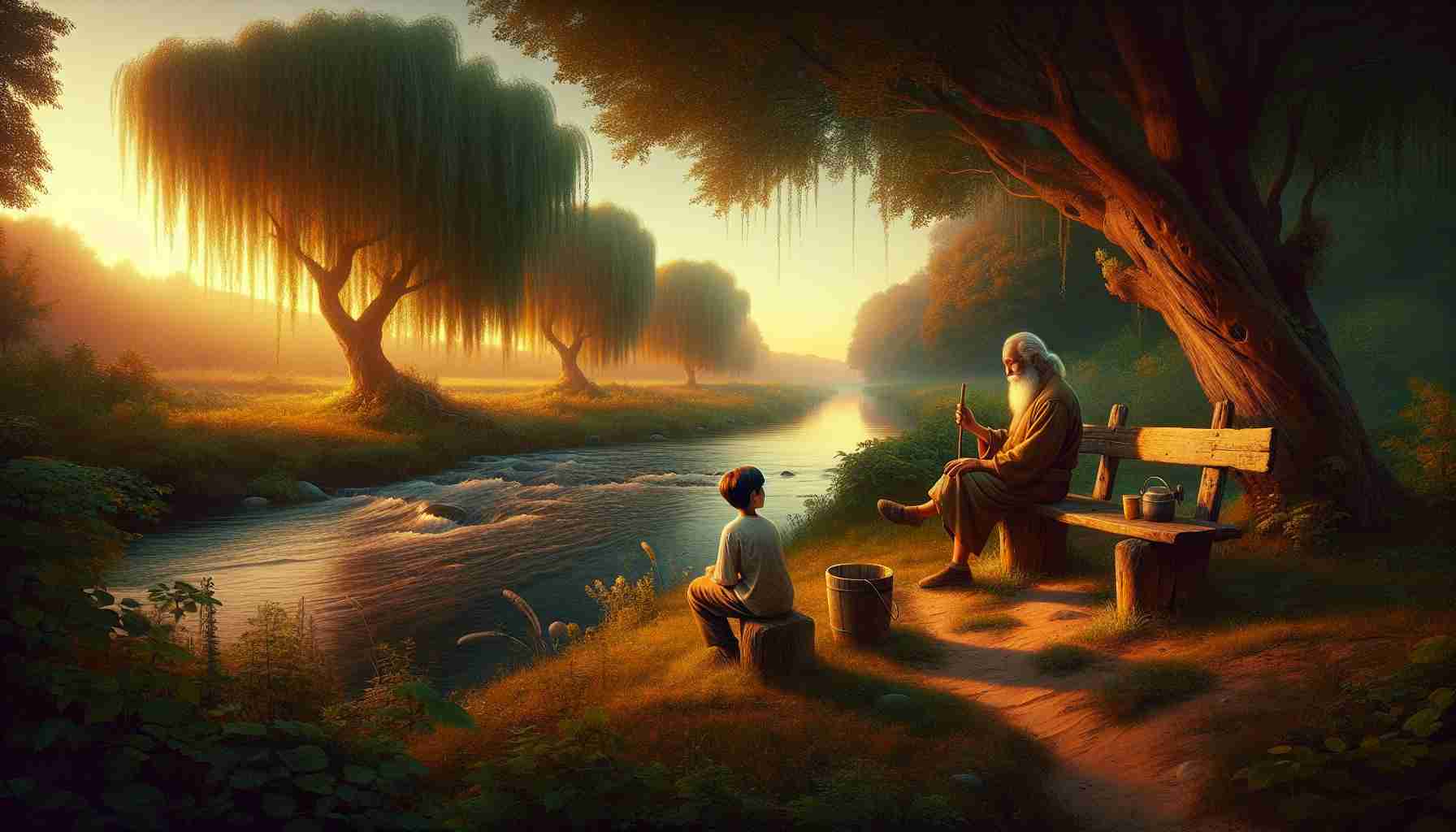

The sky was cloudy the day I gave up.
Father had asked me to carry water from the river again, and for the third time that week, I spilled every drop before reaching home. My feet slipped, or the bucket was too heavy, or my arms got tired. It didn’t matter the reason. I was tired of failing.
I dropped the wooden bucket in the dirt and sat by a tree. “I’m no good,” I muttered. “The harder I try, the worse it goes.”
That’s when my grandfather came walking up the path. Everyone in our village called him Lao Min. He was old—even older than the storyteller at the temple—but he moved with quiet ease, like a leaf floating on water.
“What troubles you, Little River?” he asked, using my nickname.
“I can’t do anything right,” I huffed. “I try so hard, but nothing works.”
He didn’t answer at first. He just sat beside me and looked at the sky.
After a while, he said, “Do you see how the clouds float? How they drift and change, without trying?”
I rolled my eyes. “Clouds don’t have to carry water in buckets.”
“But they carry water all the same,” he said with a small smile. “And they do it without effort.”
I didn’t understand. “But they’re not trying at all.”
“That is the Way of the Tao,” he said gently. “The Tao isn’t about doing more. It’s about flowing with what already is. When we try too hard, we push against the river. When we follow the current, we move with ease.”
He reached into his satchel and pulled out a small wooden cup. “Come,” he said. “Let’s go to the river.”
We walked in silence to the water’s edge. I watched the ripples dance. Grandfather filled his small cup, steady and calm. “Now you try, but move like the river—smooth, not stiff.”
This time, I dipped the bucket slowly. My hands shook less. I walked back, step by step, eyes on the path but my mind as quiet as the water beside us.
I made it home without spilling.
“You see?” Grandfather said, setting the cup on the table. “Sometimes, we try so hard to control everything, we forget to trust the moment.”
After that day, I began to notice the world more. I watched trees bend in the wind instead of breaking. I paid attention to how birds soared without forcing their wings. Even my chores became easier—not because they changed, but because I did.
Now, when things feel heavy, I remember Grandfather’s words: “Be like the river.” I stop pushing and start listening. I breathe.
I didn’t change overnight. But now, whenever I feel the urge to try too hard, I remember the quiet clouds and the dancing stream. I know that by doing less, I often understand more.
And that, I think, is the quiet power of the Tao.
The sky was cloudy the day I gave up.
Father had asked me to carry water from the river again, and for the third time that week, I spilled every drop before reaching home. My feet slipped, or the bucket was too heavy, or my arms got tired. It didn’t matter the reason. I was tired of failing.
I dropped the wooden bucket in the dirt and sat by a tree. “I’m no good,” I muttered. “The harder I try, the worse it goes.”
That’s when my grandfather came walking up the path. Everyone in our village called him Lao Min. He was old—even older than the storyteller at the temple—but he moved with quiet ease, like a leaf floating on water.
“What troubles you, Little River?” he asked, using my nickname.
“I can’t do anything right,” I huffed. “I try so hard, but nothing works.”
He didn’t answer at first. He just sat beside me and looked at the sky.
After a while, he said, “Do you see how the clouds float? How they drift and change, without trying?”
I rolled my eyes. “Clouds don’t have to carry water in buckets.”
“But they carry water all the same,” he said with a small smile. “And they do it without effort.”
I didn’t understand. “But they’re not trying at all.”
“That is the Way of the Tao,” he said gently. “The Tao isn’t about doing more. It’s about flowing with what already is. When we try too hard, we push against the river. When we follow the current, we move with ease.”
He reached into his satchel and pulled out a small wooden cup. “Come,” he said. “Let’s go to the river.”
We walked in silence to the water’s edge. I watched the ripples dance. Grandfather filled his small cup, steady and calm. “Now you try, but move like the river—smooth, not stiff.”
This time, I dipped the bucket slowly. My hands shook less. I walked back, step by step, eyes on the path but my mind as quiet as the water beside us.
I made it home without spilling.
“You see?” Grandfather said, setting the cup on the table. “Sometimes, we try so hard to control everything, we forget to trust the moment.”
After that day, I began to notice the world more. I watched trees bend in the wind instead of breaking. I paid attention to how birds soared without forcing their wings. Even my chores became easier—not because they changed, but because I did.
Now, when things feel heavy, I remember Grandfather’s words: “Be like the river.” I stop pushing and start listening. I breathe.
I didn’t change overnight. But now, whenever I feel the urge to try too hard, I remember the quiet clouds and the dancing stream. I know that by doing less, I often understand more.
And that, I think, is the quiet power of the Tao.